RESEARCH & SCIENCE
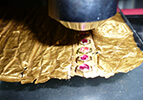 Gemstone Research
Gemstone ResearchUncovering the secrets of gems
Gemstones are fascinating wonders of nature, surrounded by a mystical aura of luxury. Dr. Tobias Häger is working on diamonds, rubies, sapphires, and emeralds every day. He is head of the Gem Materials Research group at the Institute of Geosciences at Mainz University, the only university-based team working in gemstone analysis in Germany and one of very few university institutions worldwide that is active in this specialized field.
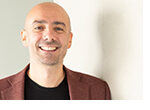 VOLCANOLOGY
VOLCANOLOGYWhat’s bubbling below the Eifel plateau?
A seismological campaign, the first of its kind in Germany, is being carried out to determine the status of the roughly 800 essentially dormant volcanoes in the Eifel region. The objective of the new project is to find out whether any of these volcanoes could again become active and what exactly is happening below the surface. What do we have to expect in the future? Professor Luca De Siena of the Institute of Geosciences at Johannes Gutenberg University Mainz (JGU) is a member of the survey team. He is to generate computer models from the newly obtained data to understand future volcanic activity in the Eifel region..
 ANTHROPOLOGY
ANTHROPOLOGYA new world order of cultural production
CEDITRAA was launched in 2021 as a joint project of the Rhine-Main Universities (RMU) alliance in cooperation with the Pan-Atlantic University in Lagos. The project aims to investigate cultural entrepreneurship in Africa and Asia and the role of digital media in the international dissemination of the related output.
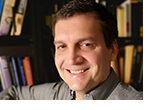 EU RESEARCH FUNDING
EU RESEARCH FUNDINGThe role of the Monastic Republic of Mount Athos in the Middle Ages
Dr. Zachary Chitwood, lecturer in Byzantine Studies at Johannes Gutenberg University Mainz (JGU), has been awarded an ERC Starting Grant to fund his research project MAMEMS. This is despite the fact that research in the humanities and social sciences rarely seems to take advantage of this form of financial support although grants from the European Research Council are specifically designed to sponsor innovative research of all kinds.
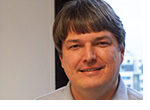 COMPUTER SCIENCE
COMPUTER SCIENCEPowerful technologies may help overcome future challenges
How will the field of artificial intelligence (AI) develop in the coming years? What sort of risks, what chances will open up? Professor Stefan Kramer of the Institute of Computer Science at Johannes Gutenberg University Mainz (JGU) is to find answers to these questions – in an interdisciplinary research project in which he and his colleagues will investigate core aspects of AI over the next six years.
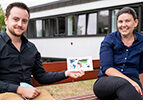 BIOCHEMISTRY
BIOCHEMISTRYGiving more attention to neglected tropical diseases
More than one billion people worldwide suffer from devastating tropical illnesses that to date have been insufficiently researched. Biochemist Professor Ute Hellmich is exploring new ways in which these neglected diseases can be treated. Her research group employs a structural biological approach, concentrating on three closely-related parasites that causes Chagas disease, African sleeping sickness, and leishmaniasis.
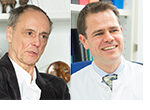 LITMUS
LITMUSSearching for effective ways to diagnose non-alcoholic fatty liver disease
Around 20 million people in Germany suffer from non-alcoholic fatty liver disease (NAFLD). It can cause severe inflammation, cirrhosis of the liver, and even cancer. At present, there is no simple technique to detect NAFLD reliably at an early stage. But this is essential for the development of appropriate new drugs and therapies. The LITMUS research project seeks to make a major contribution in this field: Involving an international consortium, with the Mainz University Medical Center being a key player, the LITMUS network is developing biomarkers that open up new horizons.
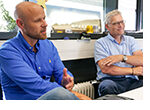 IMMUNOLOGY
IMMUNOLOGYTumors and chronic diseases outsmart the immune system
For decades, researchers at the University Medical Center of Johannes Gutenberg University Mainz (JGU) have been doing outstanding work in the field of immunology. In 2017, their work was further enhanced through the establishment of the Collaborative Research Center (SFB) 1292 on "Targeted influencing of the convergent mechanisms of ineffective immunity in cancer and chronic infections". The German Research Foundation (DFG) agreed to fund it to the tune of EUR 9.7 million for an initial period of four years.
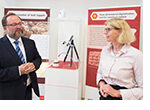 BRINGING THE PAST TO LIGHT
BRINGING THE PAST TO LIGHTNuclear physics and cuneiform studies working hand in hand
Doris Prechel, Professor of Ancient Near Eastern Philology at Johannes Gutenberg University Mainz (JGU), and Professor Frank Maas of the Helmholtz Institute Mainz (HIM) have teamed up to throw light on the past. With the help of state-of-the-art analytical devices developed for use in physics, they are busy deciphering thousand-year-old cuneiform tablets. The two researchers now presented the initial results of their cooperation in an exhibition.
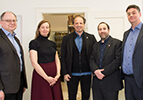 EU PROJECT REIRES
EU PROJECT REIRESNew religious research network
Twelve renowned European institutions are participating in the EU project "Research Infrastructure on Religious Studies" (ReIReS). Its aim is to promote and network the exchange of religious knowledge and research. Johannes Gutenberg University Mainz (JGU) is part of the cooperation. Talmud expert Leor Jacobi from Israel will use his ReIReS scholarship to investigate the Yom Kippur ritual of the medieval Jewish community in Mainz.
